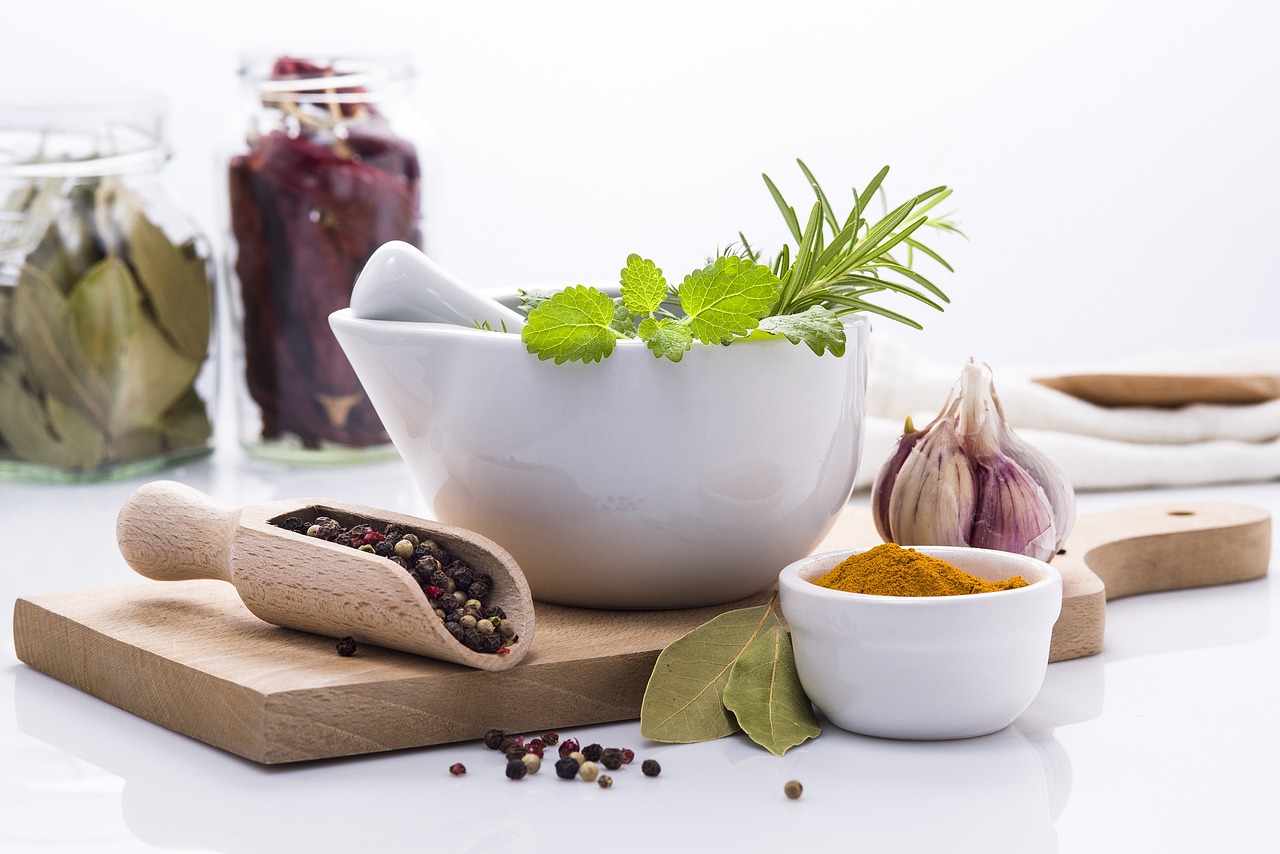Have you ever eaten a dish and felt instantly transported to sun-soaked shores, surrounded by sparkling blue waters? That’s the magic of Mediterranean cuisine! At the heart of this enchanting culinary world are commonly used herbs and spices that elevate each dish. Can you name them all?
Dive in as we explore the essence and allure of the most commonly used herbs and spices in Mediterranean cuisine. Let’s embark on this flavorful journey together, just like old friends sharing a meal.
What are Herbs and Spices?
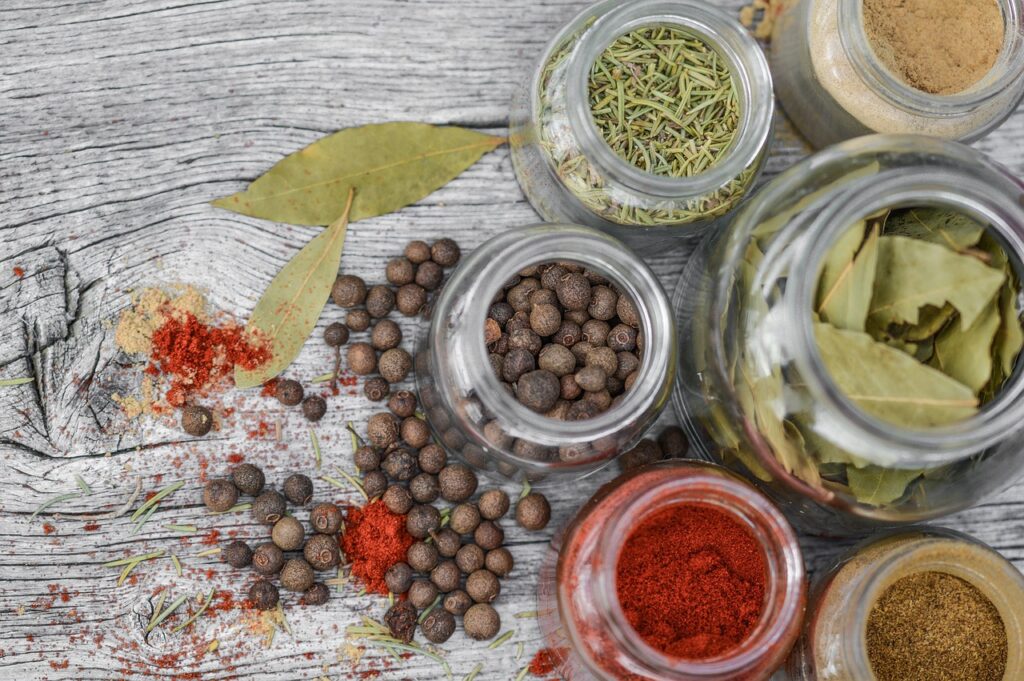
Let me tell you about herbs and spices, the unsung heroes in our kitchens. These little wonders come from various parts of plants, like leaves, stems, and seeds, and they’re not just about taste. They’re a carnival of unique tastes, fragrances, and colors. Usually, spices are the more adventurous ones, hailing from diverse plant parts and often transforming into magical powders, while herbs are typically the green, leafy parts of plants.
But wait, there’s more! These flavor powerhouses do more than just jazz up our meals. They’re like a secret health squad, boosting our immune system, fighting inflammation, and even smoothing our digestion. And let’s not forget, they’re the artists of the culinary world, adding layers of flavor complexity and splashes of color that make our dishes not just delicious but also a feast for the eyes.
How to Use Herbs and Spices in Cooking?
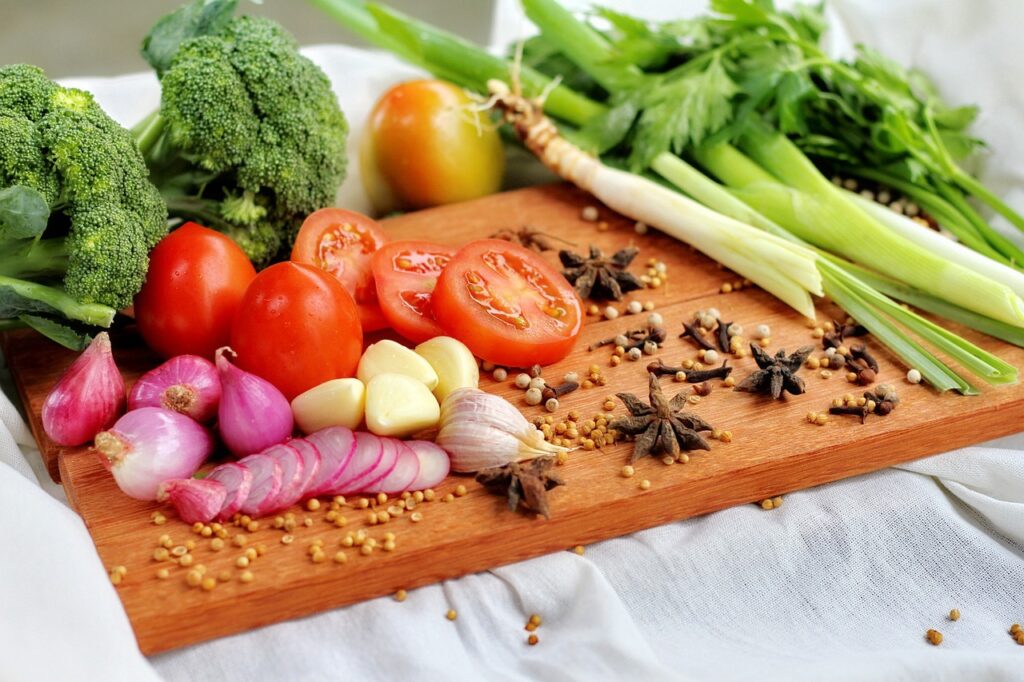
In my kitchen adventures, I’ve found that the way I use herbs and spices really depends on what I’m cooking, the type of cuisine I’m exploring, and even my mood for the day. I’ve noticed a pattern, though: herbs often make their debut early or midway through the cooking process. They’re like the opening act, setting the stage for flavors to meld beautifully.
Spices, on the other hand, tend to make a grand entrance towards the end, delivering that final, flavor-packed punch.
And here’s a little tip from my experience: herbs are quite versatile, ready to infuse their magic, either fresh or dried. Spices, meanwhile, are the chameleons of the flavor world, effortlessly transitioning from whole to ground to suit the dish’s needs. It’s this little dance with herbs and spices that turns everyday cooking into a flavorful journey!
Common Herbs in Mediterranean Cuisine
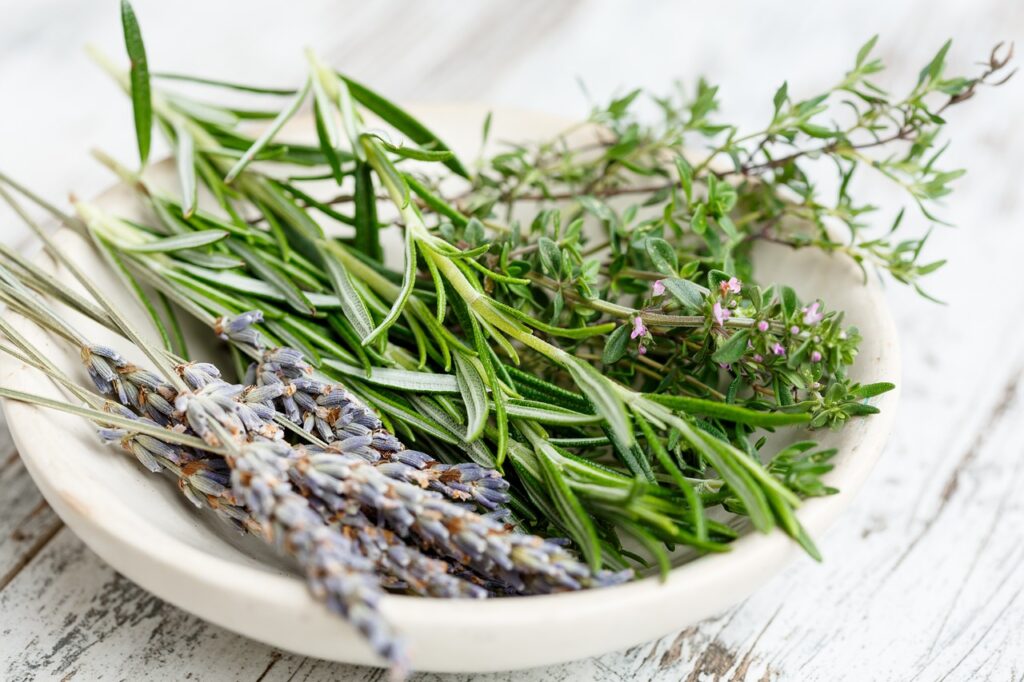
As I mentioned earlier, herbs are a staple in Mediterranean cuisine and are used in abundance to add flavor and aroma to dishes. Let’s look at some of the common herbs used in this cuisine.
🌿 Basil
Basil adds a sweet and aromatic flavor to dishes and is widely used in Mediterranean cooking. It pairs well with tomatoes, olive oil, and mozzarella cheese, making it a key ingredient in dishes like Caprese salad, Margherita pizza, and pasta sauces.
🌿 Rosemary
Rosemary brings a woody and pine-like taste to Mediterranean dishes and is often used to flavor roasted meats and vegetables. It can also be used to infuse flavor into olive oil and to make fragrant herb butter.
🌿 Oregano
Oregano is known for its peppery and slightly bitter notes and is a key ingredient in Mediterranean spice blends like za’atar. It is often used to flavor grilled meats, roasted vegetables, and tomato-based sauces.
🌿 Thyme
Thyme adds a delicate and earthy flavor to Mediterranean dishes and pairs well with garlic and olive oil. It is often used to season roasted meats, potatoes, and vegetables and can also be added to bread dough for extra flavor.
🌿 Parsley
Parsley adds freshness and a hint of bitterness to Mediterranean dishes and is often used as a garnish. It pairs well with lemon and garlic, making it a key ingredient in dishes like tabbouleh, salsa verde, and seafood dishes.
By incorporating these common herbs into your Mediterranean cooking, you can add depth and complexity to your dishes and truly savor the region’s flavors.
Common Spices in Mediterranean Cuisine
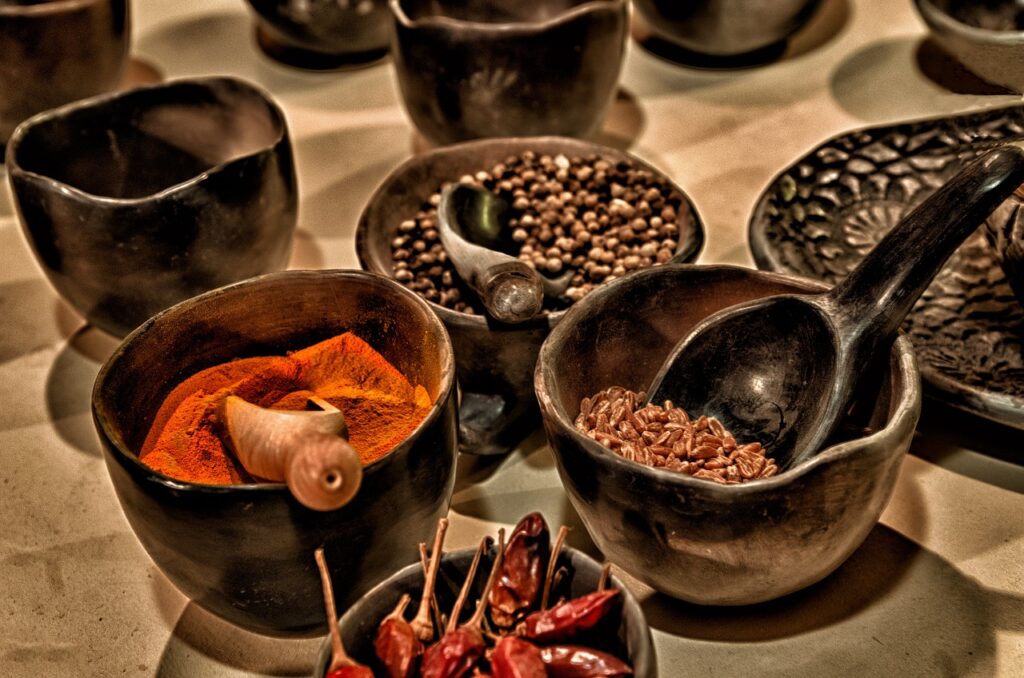
As we explored earlier, herbs are not the only ingredients that shine in Mediterranean cuisine. Spices play an equally important role in enhancing the flavors and aromas of dishes. Here are some of the most commonly used spices in Mediterranean cooking:
🌿 Cumin
This warm and nutty spice is often used in spice blends and adds depth to dishes like Moroccan tagine and Middle Eastern meatballs.
🌿 Paprika
Made from dried and ground peppers, paprika adds a smoky, sweet flavor and a vibrant red color to dishes like Spanish paella and Hungarian goulash.
🌿 Saffron
Known as the most expensive spice in the world, saffron adds a distinct aroma and a rich, golden hue to dishes like Italian risotto and French bouillabaisse.
🌿 Coriander
The seeds of the coriander plant provide a citrusy and slightly sweet flavor to dishes like Indian curries and Middle Eastern falafel.
🌿 Cinnamon
This warm and sweet spice adds depth and complexity to both savory and sweet Mediterranean dishes, like Moroccan couscous and Greek baklava.
These spices, along with the herbs we explored earlier, bring the diverse and rich flavors of Mediterranean cuisine to life. Try incorporating them into your cooking and see how they elevate your dishes to new heights of deliciousness!
Incorporating Herbs and Spices in Everyday Cooking
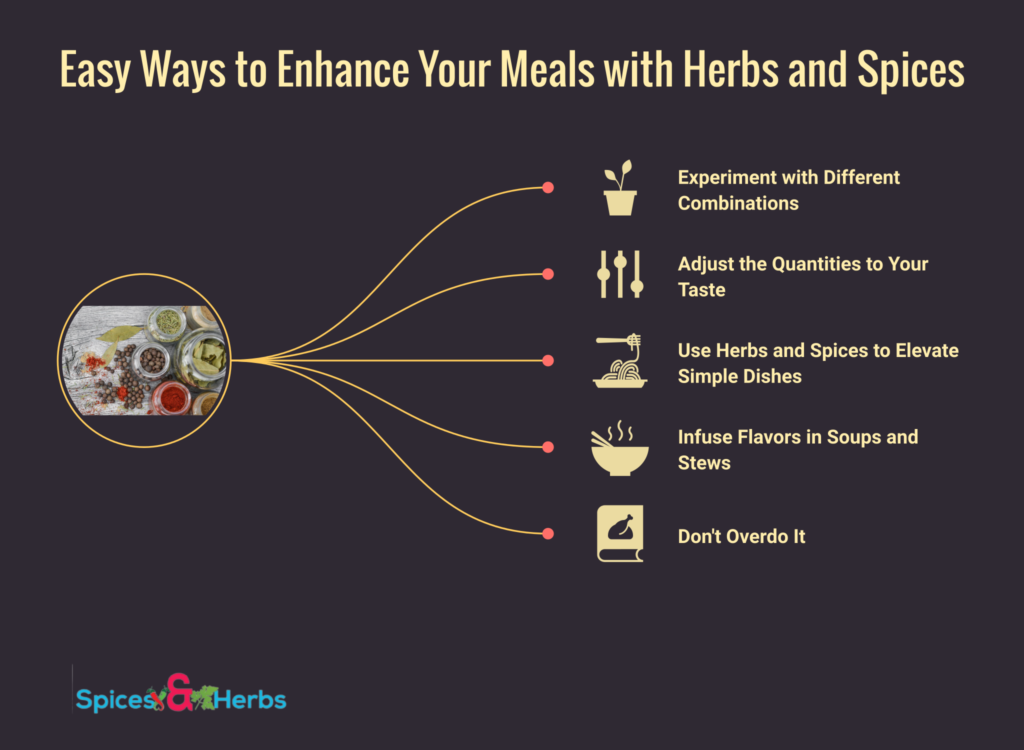
Are you ready to infuse a little Mediterranean magic into your daily meals? Incorporating herbs and spices into your everyday cooking might sound daunting, but it’s actually quite easy and adds a whole new layer of flavor to your dishes. Here are some tips:
🍳 Experiment with Different Combinations
Don’t be afraid to mix and match different herbs and spices to find your perfect flavor combination. For example, try pairing oregano with garlic and lemon for a classic Mediterranean taste, or mix cumin with coriander and paprika for a fiery spice blend.
🍳 Adjust the Quantities to Your Taste
Herbs and spices are a matter of personal preference, so feel free to adjust the quantities to your taste. Start with a small amount and gradually add more until you find the right balance of flavors.
🍳 Use Herbs and Spices to Elevate Simple Dishes
Even the simplest dishes can be transformed by adding herbs and spices. For example, sprinkle some fresh parsley or thyme over roasted vegetables, or add a pinch of cinnamon to your morning oatmeal for a warm and comforting flavor.
🍳 Infuse Flavors in Soups and Stews
Soups and stews are the perfect canvas for herbs and spices to shine. Add some rosemary or sage to a tomato soup, or use a spice blend like Ras el Hanout to flavor a hearty beef stew.
🍳 Don’t Overdo It
While herbs and spices can add wonderful flavors to dishes, it’s important not to overdo it. Use them sparingly and taste as you go to avoid overwhelming the other ingredients.
With these tips in mind, you’re ready to start experimenting with the diverse and flavorful world of Mediterranean herbs and spices. Let your taste buds be your guide, and have fun adding some sunshine to your everyday cooking.
Recipes Showcasing Mediterranean Herbs and Spices
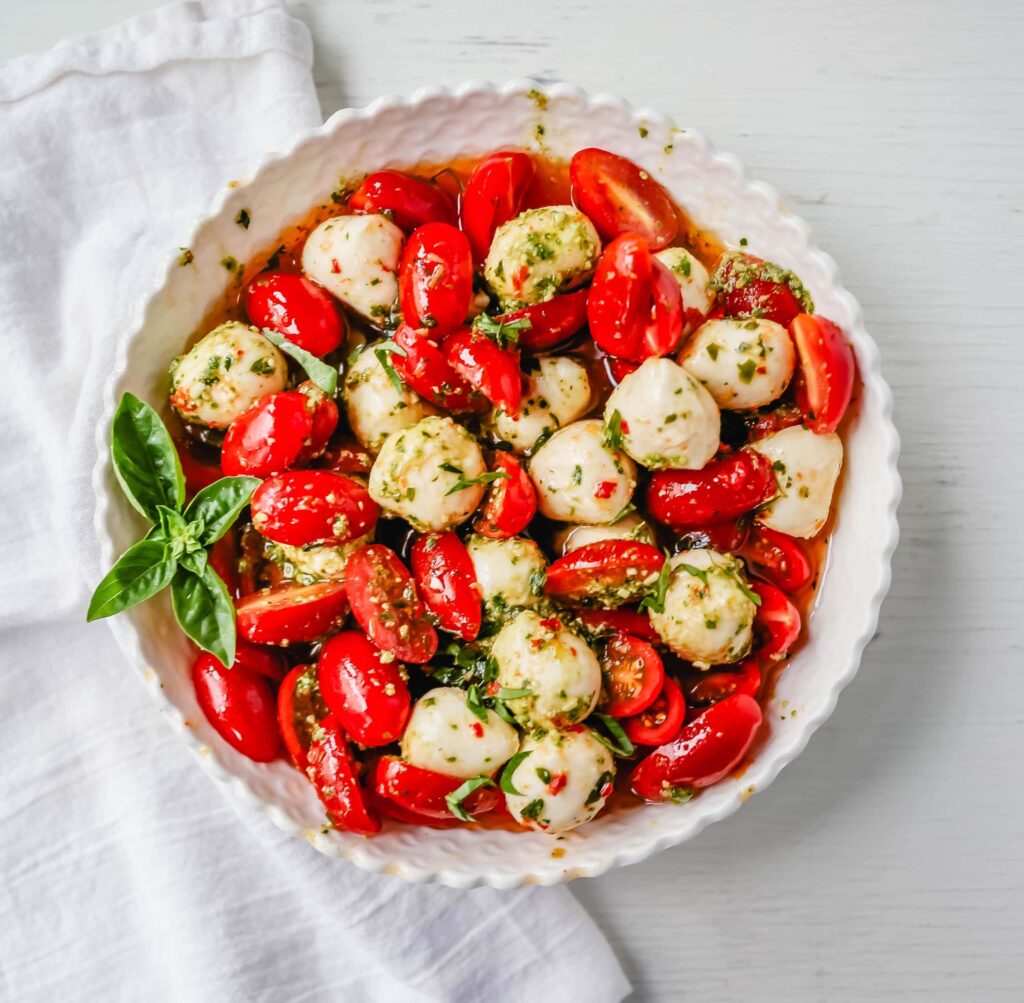
Now that we’ve explored the flavorful world of Mediterranean herbs and spices, it’s time to put them to use in some delicious recipes. From classic dishes like Caprese salad to savory stews, these recipes will showcase the unique and vibrant flavors of Mediterranean cuisine.
🥗 Caprese Salad with Fresh Basil
- 1 large tomato, sliced
- 4 slices fresh mozzarella cheese
- Handful of fresh basil leaves
- Drizzle of olive oil
- Salt and pepper, to taste
Layer the tomato and mozzarella slices on a plate, then top with fresh basil leaves. Drizzle with olive oil and sprinkle with salt and pepper.
🐔 Moroccan Chicken Tagine
- 4 chicken thighs
- 1 onion, chopped
- 2 garlic cloves, minced
- 1 teaspoon ground cumin
- 1 teaspoon sweet paprika
- 1/2 teaspoon ground cinnamon
- 1/4 teaspoon ground ginger
- 1/2 cup chicken broth
- 1/2 cup chopped dried apricots
- 1/4 cup chopped fresh parsley
- Salt and pepper, to taste
Season the chicken with salt and pepper, then brown on both sides in a Dutch oven or tagine. Remove chicken and set aside. In the same pot, sauté the onion and garlic until softened. Add the cumin, paprika, cinnamon, and ginger, and cook for 1-2 minutes. Stir in the chicken broth and dried apricots, then return the chicken to the pot. Cover and cook on low heat for 45 minutes to an hour, or until the chicken is cooked through and tender. Garnish with fresh parsley before serving.
🥔 Roasted Potato Wedges with Rosemary
- 4 large potatoes, cut into wedges
- 2 tablespoons olive oil
- 2 teaspoons chopped fresh rosemary
- Salt and pepper, to taste
Preheat oven to 400°F. Toss the potato wedges with olive oil and rosemary, then season with salt and pepper. Arrange the wedges in a single layer on a baking sheet, and bake for 20-25 minutes or until golden brown and tender.
These recipes are just a taste of the possibilities when it comes to incorporating Mediterranean herbs and spices into your cooking. Whether you’re using them to add depth and flavor to meat dishes or simply garnishing salads with fresh herbs, the flavors of the Mediterranean are sure to transport you to a world of sunshine and delicious cuisine.
Frequently Asked Questions
Q: What is the difference between herbs and spices?
Herbs are typically derived from the leaves of plants, while spices can come from various parts such as seeds, stems, bark, or roots.
Q: How can I incorporate herbs and spices into my everyday cooking?
You can add herbs and spices to salads, season meats, or use them to infuse flavor into stews and soups.
Q: Can you provide recipes that showcase Mediterranean herbs and spices?
Yes! From Caprese salad with fresh basil to savory Moroccan tagines, there are plenty of recipes that highlight the flavors of Mediterranean herbs and spices.
Q: What role do herbs and spices play in flavoring food?
Herbs and spices not only add aroma and taste but also enhance the overall flavor profile of a dish, adding depth and complexity.
Q: Does dried or fresh herbs and spices make a difference in cooking?
Yes, fresh herbs and spices tend to have a more vibrant flavor compared to their dried counterparts. However, dried herbs and spices are more convenient and have a longer shelf life. It’s best to experiment with both types to see which works best for your dish.
Conclusion
In conclusion, exploring the commonly used herbs and spices in Mediterranean cuisine has been a flavorful journey. It’s amazing to see how these simple ingredients can transform a dish and add depth and complexity to its taste. From the sweet aroma of basil to the warm spice of cinnamon, the Mediterranean ingredients will tantalize your taste buds.
As you start experimenting with these herbs and spices, remember that the key is to balance their flavors and quantities to enhance the overall taste of your dish. It’s also essential to understand the difference between herbs and spices and how they can be used in your cooking.
Thus, don’t be afraid to get creative and add your own twist to classic Mediterranean dishes with these delightful ingredients. Whether it’s a sprinkle of oregano on your salad or a pinch of saffron in your paella, incorporating these herbs and spices can take your cooking to the next level.
I hope this article has inspired you to try new recipes in your kitchen and explore the wonderful world of Mediterranean cuisine.

